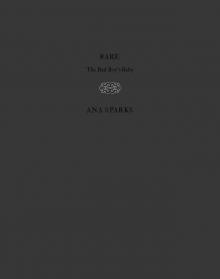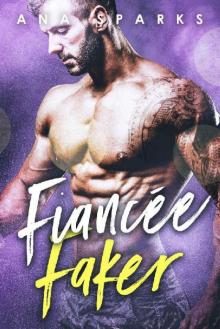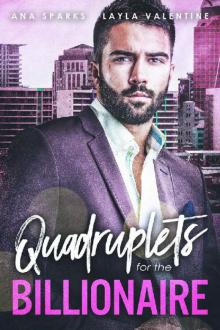- Home
- Ana Sparks
Indebted To The Sheikh (You Can't Turn Down a Sheikh Book 5)
Indebted To The Sheikh (You Can't Turn Down a Sheikh Book 5) Read online
Indebted to the Sheikh
Ana Sparks
Holly Rayner
Contents
Indebted to the Sheikh
1. Cassie
2. Cassie
3. Cassie
4. Cassie
5. Cassie
6. Cassie
7. Cassie
8. Salman
9. Cassie
10. Cassie
11. Cassie
12. Salman
13. Cassie
14. Salman
15. Cassie
16. Cassie
17. Cassie
18. Cassie
Epilogue
The Sheikh’s Bride Bargain
Introduction
Chapter 1
More Series by Holly Rayner
Indebted to the Sheikh
Copyright 2018 by Ana Sparks and Holly Rayner
All rights reserved. Except for use in any review, the reproduction or utilization of this work in whole or in part by any means, now known or hereafter invented, including xerography, photocopying and recording, or in any information storage or retrieval system, is forbidden without the explicit written permission of the author.
All characters depicted in this fictional work are consenting adults, of at least eighteen years of age. Any resemblance to persons living or deceased, particular businesses, events, or exact locations are entirely coincidental.
Chapter 1
Cassie
Was speed-dating going to be the answer to finding Mr. Right?
Oddly enough, it was my cousin Clay’s awful girlfriend who had first suggested giving it a whirl. I had gotten roped into eating lunch with her and Clay the week before. She had asked if I was still “looking.”
I stared at her blankly. “Looking for what?”
“Looking for love,” Leah said, laughing. “I know you wouldn’t mind dating if you had the time. Clay says you’re just too busy with work.”
“Is that right?” I shot Clay a glare from across the table. It was true, though; sometimes, I felt married to my desk and laptop.
“You just have to put yourself out there!” Leah jangled her gaudy bracelets, which glittered in the mid-summer sunlight. “There’s a speed-dating thing they’ve started doing on Tuesday nights in the basement of the Pentecostal church. That’s how my brother met his ex.”
“You think I should go?” I asked skeptically. Wait, did she say his ex?
“Yeah, totally. You should take Aisha.” Aisha Khoury was my best friend. “I’d go with you if I wasn’t already attached.”
“Too bad for you,” Clay joked, mussing her hair with his lips.
Leah pushed him away. “It’s better than a real date because they put you on a timer for…I think Kevin said it was ten minutes. And if you don’t like the guy, you can move on to someone else when the ten minutes are over.”
“Sounds ideal,” I said, poking at my chicken salad. “I wish all my dates could be that brief.”
That might have been the end of it, if I hadn’t made the mistake of mentioning her suggestion to Aisha when we’d met up for karaoke that night.
“Of course, you should go!” she exclaimed, twirling around in her teal, fifties-style dress. “What thirty-year-old single lady wouldn’t avail herself of this opportunity?”
“One who’s really busy and doesn’t know if she even has time to be in a relationship.”
“You ought to try it, at least. Do you know how long I’ve been waiting for you to get married? I don’t want to die before you walk down the aisle.”
“Whoa, who said anything about getting married?” Aisha’s joy was both infectious and unnerving. “I’m just going on a date. A series of very short dates.”
“You’ll do it, then?” she asked, reaching for my hand. She was wearing Audrey Hepburn pearls, and her wrists smelled of lavender perfume.
“Well, I can’t really get out of it, now, can I? I don’t want you to die of disappointment.”
Aisha made an elegant and perfectly executed pirouette, despite the fact that no music was playing. “You don’t understand. I want you to find a boy even more than I want that for myself! I don't care if I die single, as long as I live to see you married off and happy.”
“Well, try to lower your expectations,” I said with a snort, reaching for the mic. “There are still a few critical steps between now and then.”
And that was how I found myself sitting in the basement of a church on a Tuesday night, across from a gangly boy whose breath smelled of saltwater taffy.
Maybe it was the fact that Aisha couldn’t come with me which had discouraged me from wanting to come in the first place. I don’t know. I just know that when I stepped into that basement, I suddenly felt shy and awkward, like I didn’t quite know what to do with my arms. I felt like no one would want to go out with me because I was uniquely un-dateable.
If only that had been the case.
“My name is Gage Tashian,” the guy in front of me was saying. His voice cut through the fog of my mind like a carnival ghost train. “I’m twenty-five, and I work at the Phoenix Film Plex.”
He paused, and I could tell this was the part where I was supposed to say something. “My name’s Cassie, and I’m an investigative reporter at the Phoenix Hornpipe. I’m thirty years old. I wrote an award-winning exposé of the Fire Cloud Corporation, and I’ve won the Southwest Peabody Award two years running.”
“Wow, prestigious.”
I shrugged modestly. “It’s not the Pulitzer Prize, but I’ll get there.”
My phone buzzed in my pocket. Thankful for the distraction, I brought it out and opened it. Just a text from Aisha wanting to know how the date was going. I told her it was fine and returned my cell to my pocket with a sigh.
“You seem tense,” said Gage with a laugh.
“Thanks for noticing.” Had we really only been here for three minutes? It felt more like twenty. I wished Aisha hadn’t promised to come and then backed out at the last minute.
“They say journalism is the lifeblood of a democracy,” said Gage pompously. “Democracy dies in darkness.”
“I’m just trying to make a living, honestly,” I replied.
“I can’t imagine the stress you must be under—”
“Why don’t you tell me about the theater?” I interrupted loudly.
“The theater?” Gage gave me a blank stare as if trying to figure out why he had been interrupted. The truth was, I didn’t have the energy to carry on my own end of a conversation tonight. He grinned ominously. “What would you like to know?”
“Just anything. What do you do?”
This proved to be a mistake, as he launched into a long-winded explanation of the various candies that were sold at the register and why he suspected that different people chose different ones. I drifted in and out of the conversation, my eyes on the clock on the back wall. Five minutes.
“My ex-girlfriend, Dana, didn’t think I should be working at a theater chain,” Gage was saying. “‘Slumming it,’ I think, was the phrase she used. But she works at a local nonprofit and can barely afford to pay rent, so, which of us is the real loser?”
“Just FYI, if you want to have a relationship in the future, you really shouldn’t badmouth your exes,” I said.
Gage smiled foolishly as if he had just been struck in the face. “And she loved licorice wands,” he said, as if he hadn’t heard me. “Who likes those?”
Maybe I shouldn’t have been so frustrated, I kept telling myself. I was nervous and taking it out on him. But then he launched ba
ck into his speech about candies, and whatever guilt I had been feeling evaporated.
“Eating licorice, I’m sad to say, doesn’t say much for you as a person. In my experience, licorice-lovers tend to string you along, pretending to be interested, only to dump you the moment they meet someone with a law degree and a better-paying job.”
“How many licorice-lovers have you known?” I asked.
“Three.”
“And all of them dumped you?”
Gage was silent.
Unless something miraculous happened in the next three minutes, I was counting this as a loss. I didn’t need the full ten minutes to know that Gage and I weren’t meant to be together. He seemed to have given up, too, because he sank back into his chair and began eating another taffy with a look of defeat.
“What are people who eat taffy like?” I asked him.
“Total badasses,” Gage replied.
Just then, my phone buzzed again—not once, but three times in succession. Someone was calling me.
In total relief for having an excuse to get away from this boy, I excused myself and sprang from my chair, heading for the stairs. I didn’t even wait until I was out of the room before accepting the call.
“Hello?”
“Cassie,” Aunt Patricia said, her voice grave and hushed, “I’ve got some bad news.”
“What is it?” Anything is better than listening to this horrible boy drone on, I thought.
The lights of a passing ambulance painted the church hallway a deep red and blue as I waited for her to speak.
“I’m really sorry you had to find out this way,” she said, “but your father has passed away—apparently, he had a quite sudden and brief battle with cancer. The funeral is on Thursday, in Paris.”
Chapter 2
Cassie
I pushed open the door of the church and headed for my station wagon. By now, night had fallen, and I could hear a party of laughing couples from the balcony of a Mexican restaurant down the street. The sound grated on my nerves.
My estranged father was dead. How was I supposed to feel about that?
Alarmed by the responsibilities of being a father, and with his and my mom’s relationship breaking down, my dad had fled to his native Paris not long after I was born. Mom kept expecting him to come back, but he never had. Instead, he had remarried and made a small fortune in business. I had never seen a dime of that money, and had seen him all but once, on the weekend of my tenth birthday, at my mother’s funeral.
Hard to believe that had been twenty years ago.
“You still there, Cassie?” came the soft voice of Aunt Patricia.
I fumbled for the keys in my purse. “I’m still here.”
“Listen, I completely understand if you don’t want to go. I know you’re busy with work, and it’s been a while since you and your dad were friends—”
“We were never friends,” I said coldly. And now, we never would be. I had always held out hope that one day, he and I would reconcile. And as long as he was still breathing, I hadn’t given up hope. But he had only ever spoken to me once a year, on my birthday. And now, he was no longer breathing.
“I’m surprised you even still want to talk to your dad,” Aunt Patricia had said to me recently. “If I were you, I would’ve given up ages ago.”
“If it were anyone else, I probably would have,” I’d replied. “But he’s my dad. It’s hard to give up on your parents, even when you want to.”
Sometimes, the parent-child bond felt like a bad romantic relationship: they could be callous and cruel and cut you out of their life, but you kept coming back. You couldn’t help it.
“Don’t I know it,” Aunt Patricia had said. “I’ve told Clay that it doesn’t matter what he does—he could drop out of college, get a Mohawk, go to Disneyland without me—but he’d still be my son.”
Clay was twenty-two and had only been a squalling infant when I’d moved in with him and Aunt Patricia after my mother’s death. I had lived with them in Phoenix for most of my life.
Even now, when I could afford a place of my own, I still lived with Patricia, who was getting older and needed someone to help out. Clay was finishing his last year in community college and had moved into an apartment with his girlfriend across town, though the rest of us fervently hoped their relationship would prove short-lived—Leah was no good for him.
“Cassie?” Aunt Patricia’s voice brought me back to the present. “I think you ought to at least consider going to the funeral.”
I turned on the car’s headlights, revealing a flurry of dust and motes like the static on an old TV. “Why’s that?”
I knew what she was going to say: that it would do my heart good to see him laid in the ground, that I might never get closure otherwise, that I ought to at least say goodbye.
Instead, she hesitated for a moment before saying, “This is going to come as a shock—I know I didn’t believe it when they first told me—but your dad left you everything in his estate.”
I froze with my hand on the steering wheel. “Excuse me? You’re joking, right?”
“Cassie, sweetie, you know I wouldn’t joke about something like this.”
“Then I must have misheard you. Because it really sounded like you just said my father left me his whole estate.”
“Well, you were his only child, and he wasn’t going to leave it all to Adèle.”
My father and his second wife had divorced at around the time of my mom’s death. Rumors persisted in the family that he had been devastated by her untimely passing, filled with regret.
Aunt Patricia continued. “I’m as surprised as you, but who else was he going to leave it to?”
“Fair point.” I scowled at myself in the rearview mirror, wishing I didn’t look so much like a woman who had just been crying. “I don’t know how this works. I’ve never had a rich relative die and leave me their entire estate before. Do they just deposit the money directly into my bank account? Or are we talking houses, paintings, a beloved childhood sled?”
“They didn’t tell me much,” said Patricia. “When my dad passed away, all he left us was his crockpot. But if you’re even remotely interested in collecting, you’ll have to fly out to Paris. Skip the funeral if you must, but I think it’s important that you go over there, if only to collect what you’re due.”
“I wish they could just meet me here,” I grumbled. The prospect of a few days in Paris was tempting, but I also had a major assignment due before the end of the week. I backed out of the parking lot and began making my way home. “Where are you right now, by the way?”
“I’m still at work. A lawyer just called to give me the news. They must have had my number from when I was your guardian.”
“Okay, well, I’m on my way back to the house. Any chance you’ll be home soon? I really don’t want to be alone tonight.”
“I get off at around midnight.” Aunt Patricia worked as a prison nurse and kept long hours, often not getting home until four or five in the morning. “You ought to call Clay and see if he’ll come over.”
“Think I’ll pass.” If Clay came over, Leah would surely follow, and that was the last thing I wanted tonight—the two of them were constantly fighting. “I might text Aisha and see what she’s doing. She’s been wanting to visit Paris for years, poor girl.”
“Then I’ll let you go so you can call her.” My aunt paused again, and I could sense there was something else that she wanted to say. “The lawyer mentioned one item that I think you might be interested in.”
“What’s that?” I asked in a bland tone as I turned onto the highway. The gray skeletal lamps cast an eerie yellowish glow on the overpass.
“Apparently, your father owned a first-edition copy of The Wizard of Oz, signed by—I can’t for the life of me remember the name of that guy. It’s on the tip of my tongue.”
“L. Frank Baum.” I sat up straight in my seat with a feeling of keen interest. “Mom used to read that book to me when I was little. I alwa
ys wondered what had happened to it.”
“Well, it must have gotten sent to your dad by accident, after your mother passed,” Aunt Patricia said softly. “Anyway, he must’ve known how important it was to you, because he wanted you to have it.”
“What happens if I’m not able to fly over there this week and get it?”
“I don’t know, sweetie. I’d like to think they would hold onto it for you. I don’t know if they have a legal right to throw it out.”
“They’d better not. At least give me a few days to get over there.”
“Yeah. Well, I’d better get going, but I’ll see you when I get home tonight, if you’re still up.”
“Okay, see you later.”
I hung up and tossed the phone onto the passenger seat, my mind racing. From the sound of it, I could now be the owner of a house and car in France, maybe even a business. But my mind was focused on the book my aunt had mentioned.
The books we read in our youth have a way of imprinting themselves on our hearts, and The Wonderful Wizard of Oz had been my favorite book since the first time I read it with Mom. A few years ago, I had bought a paperback copy with the original illustrations by W. W. Denslow in an airport in Johannesburg. The writing itself didn’t hold up as well as I had remembered, but I didn’t care because the story was so rich and engaging. As much as I loved the movie, I had always felt the book was superior. It was dark and surreal and disturbing in the tradition of all great fairy tales, and there was so much the movie had left out.
And now that I knew where my copy had gone, I wanted it back. I wanted to hold it in my hands and smell it and remember being eight years old, sitting in my mother’s lap and marveling over the illustrations of Dorothy in her blue gingham dress, carrying little Toto in her picnic basket. I couldn’t bring Mom back from the dead, and I couldn’t travel through time—as much as I sometimes wanted to. This was probably the closest I would ever come to doing either.

 Dr. Ohhh
Dr. Ohhh Indebted To The Sheikh (You Can't Turn Down a Sheikh Book 5)
Indebted To The Sheikh (You Can't Turn Down a Sheikh Book 5) Dr. Ohhh - A Steamy Doctor Romance
Dr. Ohhh - A Steamy Doctor Romance BARE: The Bad Boy’s Baby
BARE: The Bad Boy’s Baby Fiancée Faker - A Bad Boy Fake Fiancée Romance
Fiancée Faker - A Bad Boy Fake Fiancée Romance V-Card For Sale – A Billionaire/Virgin Second Chance Auction Romance
V-Card For Sale – A Billionaire/Virgin Second Chance Auction Romance Quadruplets for the Billionaire (Babies for the Billionaire Book 2)
Quadruplets for the Billionaire (Babies for the Billionaire Book 2)